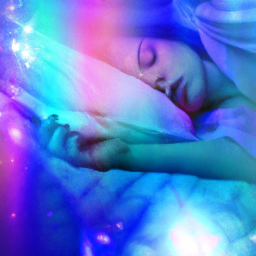I’ve always been fascinated by the mysteries of the human mind, and one question that constantly intrigues me is: how long does a dream last?
After all, we spend roughly a third of our lives sleeping, and a significant portion of that time is spent dreaming. But despite the fact that we’ve been studying dreams for centuries, there’s still much we don’t know about this enigmatic phenomenon.
They say that dreams are like windows into our subconscious, offering us a glimpse into the deepest recesses of our minds. But for all their complexity and vividness, dreams can be notoriously difficult to pin down.
In this article, I’ll take a closer look at the science of dreaming, exploring the different theories about how and why we dream, and examining the debate over how long dreams actually last.
Whether you’re a seasoned dreamer or simply curious about the mysteries of the mind, this article is sure to offer some fascinating insights into the nature of the dream world.
Key Takeaways
- Dream duration can be influenced by various factors such as sleep stage, age, personal circumstances, stress, sleep position, daily activities, and medications.
- The most vivid and memorable dreams occur during REM sleep, which is when most dreaming occurs and dreams tend to be longer and more intense.
- Theories suggest that dream duration is directly proportional to the amount of emotional processing that our brains engage in while we sleep, making dreams important for cognitive and emotional development.
- Understanding dream experience and analyzing dreams can provide valuable insights into the mysteries of sleep, the workings of the brain, and practical applications in the field of mental health.
Understanding the Nature of Dreams
Ever wonder what really goes on in your mind when you dream? Let me tell you, it’s a pretty fascinating topic.
Dreams are a natural occurrence that happens during our sleep, and they are often a reflection of our subconscious mind. They can be incredibly vivid and realistic, or they can be completely abstract and nonsensical. Sometimes we remember our dreams, and other times we have no recollection of them at all.
But the most interesting question about dreams is how long they actually last.
The truth is, dreams don’t actually last very long. They typically only last for a few seconds or minutes, but they can feel like they go on for much longer. This is because the human brain is capable of processing information at an incredibly fast rate, so even a short dream can feel like a long and complex story.
But don’t worry, we’ll dive into the science behind dreaming in the next section.
The Science of Dreaming
I find the science of dreaming fascinating. Our brains are still very active during sleep, and this activity influences our dreams. The most vivid and memorable dreams occur during Rapid Eye Movement (REM) sleep.
External factors, such as stress, medication, and alcohol, can all affect the content and frequency of our dreams.
Brain Activity During Sleep
During sleep, the brain activity changes and can affect the duration of our dreams. When we fall asleep, our brain waves slow down and become more synchronized. This is the non-REM (NREM) stage of sleep, where our body is in a state of deep relaxation and restoration. During this stage, our dreams are usually shorter and less vivid.
However, during the rapid eye movement (REM) stage of sleep, our brain activity increases and becomes more similar to when we’re awake. This is when most of our dreaming occurs and our dreams tend to be longer and more vivid. REM sleep is important for our cognitive and emotional development, as it helps us process and consolidate memories, regulate mood, and develop problem-solving skills.
Understanding the different stages of sleep and how they relate to dreaming can help us better understand the importance of getting a good night’s rest.
REM Sleep and Dreaming
When you enter the REM stage of sleep, your brain activity increases and you’ll experience longer and more vivid dreams. REM stands for Rapid Eye Movement, which comes from the quick movements of your eyes as you dream.
This stage usually occurs about 90 minutes after falling asleep and can last for up to an hour. During REM sleep, your body is mostly paralyzed to prevent you from acting out your dreams.
While everyone dreams during REM sleep, not everyone remembers their dreams. This is because the brain’s activity during this stage is very similar to when we’re awake, making it harder for us to differentiate between reality and dreams.
However, some people are able to remember their dreams better than others. This could be due to a variety of factors, such as sleep quality, stress levels, and even genetics.
Factors That Affect Dreaming
Various factors can impact the content and intensity of an individual’s dreams, such as stress levels, sleep position, and daily activities. Stressful events throughout the day can cause vivid and intense dreams at night, while a relaxed and calm day can result in more peaceful and pleasant dreams. Sleeping on one’s back can lead to more vivid dreams, whereas sleeping on one’s stomach can cause more routine and mundane dreams. Additionally, certain medications can also affect dream content and intensity.
To further illustrate the impact of these factors, here is a table outlining the possible effects of different variables on dream content and intensity:
| Factor | Effect on Dream Content/Intensity |
|---|---|
| Stress | More vivid and intense dreams |
| Sleep position | Back – more vivid dreams; Stomach – more routine dreams |
| Daily activities | Events of the day may influence dream content |
| Medications | Can impact dream intensity and content |
As we explore the debate over dream duration, it is interesting to consider how these factors may play a role in the length of dreams.
The Debate Over Dream Duration
I find it fascinating how long dreams can last for, and there seems to be some debate among experts on the topic.
Studies have been conducted to determine the average length of a dream, but there are also various theories on why some dreams feel longer than others.
Additionally, there are factors that can influence the duration of a dream, such as the stage of sleep and the individual’s overall sleep quality.
Studies on Dream Duration
Research has shown that dreams typically last between 5 to 20 minutes. However, it’s important to note that dream duration can vary depending on a variety of factors such as sleep stage, age, and personal circumstances.
For example, dreams during REM (Rapid Eye Movement) sleep typically last longer than dreams experienced during non-REM sleep. Studies have also shown that people can have multiple dreams within a single sleep cycle, with each dream lasting anywhere from a few seconds to several minutes.
The complexity and vividness of the dream can also affect its duration. While there’s still much to be learned about the science of dreams, these studies provide some insight into the intriguing phenomenon of dream duration.
Moving forward, let’s explore some of the theories on dream duration and what they may tell us about our subconscious minds.
Theories on Dream Duration
One fascinating idea about dream duration is that it may be linked to the depth of our subconscious thoughts. Some theories suggest that the duration of our dreams is directly proportional to the amount of emotional processing that our brains are engaged in while we sleep.
In other words, the more emotionally charged our thoughts, the longer our dreams may last. This idea has led researchers to explore the relationship between dream duration and emotional experiences in our waking lives.
Here are some possible emotional responses to this idea:
- Curiosity: How do our brains process emotions during sleep, and what impact does this have on our waking lives?
- Intrigue: Could our dreams be a window into our subconscious minds, revealing hidden emotions and desires?
- Wonder: What kinds of experiences might lead to longer or more vivid dreams, and how can we learn more about our own dream patterns?
- Surprise: I never thought about the relationship between dream duration and emotional processing before!
- Excitement: This idea opens up a whole new avenue of research into the mysteries of the human mind.
As we’ve seen, there are many intriguing theories about dream duration. However, there are also many factors that can influence how long we dream for, including sleep stage, medication use, and underlying medical conditions. Let’s explore some of these factors in more detail in the next section.
Factors That Influence Dream Duration
You may be surprised to learn that various factors can affect how much time you spend dreaming during your sleep. One such factor is sleep duration. The longer you sleep, the more time you have to cycle through different stages of sleep, including REM (rapid eye movement) sleep, which is when most dreaming occurs. Therefore, if you sleep for a longer period, you may have more dreams and longer dream periods.
Another factor that can influence dream duration is age. As we age, the amount of time we spend in REM sleep decreases, which means that we may have fewer and shorter dreams. Additionally, certain medications and substances can affect the duration of our dreams. For example, alcohol consumption before bed can reduce the amount of time we spend in REM sleep, which may lead to shorter dream periods.
Understanding these factors can help us better understand our own experiences with dreaming.
The Experience of Dreaming
When you’re in the middle of a dream, it can feel like time is passing differently than in real life. Sometimes, a dream can feel like it lasts for hours, while in reality, it may only last a few minutes.
The experience of dreaming is unique to each individual, and there are several factors that can affect how long a dream feels like it lasts. One factor that can influence the experience of dreaming is the level of engagement in the dream. If a dream is particularly vivid and intense, it may feel like it lasts longer than a dream that is less memorable.
Other factors, such as sleep deprivation or the use of certain medications, can also influence the experience of dreaming. Additionally, the content of a dream can impact how long it feels like it lasts. Dreams that are emotionally charged or contain a lot of detail may feel longer than dreams that are more abstract or less eventful.
As we continue to explore the mysteries of dreaming, researchers are finding practical applications for this knowledge. By understanding more about the experience of dreaming, we may be able to develop new treatments for sleep disorders or gain insights into the workings of the brain. Understanding how time perception is altered in dreams may also have implications for understanding altered states of consciousness in other contexts.
Practical Applications of Dream Research
Explore the exciting possibilities of dream research and how it could benefit your understanding of sleep disorders, brain function, and altered states of consciousness. Dream research can provide valuable insights into the workings of the human brain and the mysteries of sleep. By studying dreams, researchers can gain a better understanding of how the brain functions during sleep and how different sleep disorders affect the brain and the body.
One practical application of dream research is the treatment of sleep disorders. By analyzing the dreams of patients with sleep disorders, researchers can identify patterns that may be contributing to their sleep problems. For example, nightmares may be a symptom of post-traumatic stress disorder (PTSD), and by treating the underlying PTSD, the nightmares may subside. Another application is the use of dreams to gain insight into altered states of consciousness, such as lucid dreaming or out-of-body experiences. Through dream research, we can unlock the secrets of the mind and explore the fascinating world of human consciousness.
| Column 1 | Column 2 | |||
|---|---|---|---|---|
| Sleep | Brain Function | |||
| Dreams | Altered States | |||
| Neurological | Consciousness | |||
| Patterns | Sleep Disorders | |||
| Nightmares | Psychological | Trauma | and Mental Health |
Frequently Asked Questions
Can dreams predict the future?
I’ve had dreams that felt so real, it’s hard not to wonder if they hold any significance. Some people believe dreams can predict the future, but there’s no scientific evidence to support this claim.
Why do some people have recurring dreams?
As someone who has experienced recurring dreams, I can say that they can be caused by unresolved emotions or trauma. Seeking therapy or journaling about the dreams may help to understand and process them.
Do blind people dream?
Blind people do dream, but their dreams are influenced by their experiences. My dreams are like a painting, where I can see the colors and details, but without sight, a blind person’s dreams may be more focused on sound and touch.
Can lucid dreaming be learned?
Yes, lucid dreaming can be learned through various techniques such as reality checks, keeping a dream journal, and practicing mindfulness. It takes practice and patience, but it is possible to control your dreams.
What is the significance of nightmares?
Nightmares can be significant in revealing underlying fears or anxieties. They can also disrupt sleep and lead to negative emotions. With practice, lucid dreaming techniques can be employed to transform nightmares into positive experiences.
Conclusion
So, how long do dreams last for? The answer is not straightforward, but what we do know is that dreams are complex and fascinating phenomena that continue to intrigue scientists and researchers alike.
Personally, I’ve always been fascinated by the vivid and sometimes surreal experiences that I have in my dreams. It’s almost like a movie playing out in my mind, with different characters and plot twists. And while I may not always remember the details, the emotions and feelings that I experience in my dreams often stay with me long after I wake up.
In a way, dreams are like a window into our subconscious minds, revealing our deepest fears, desires, and thoughts. One could say that dreams are like a kaleidoscope, constantly shifting and changing to create new patterns and images. And just as each person sees something different when looking through a kaleidoscope, each person’s dreams are unique and personal to them.
While we may not fully understand the science behind dreaming, it’s clear that dreams play an important role in our lives, whether for entertainment, self-discovery, or problem-solving.
So, the next time you close your eyes and drift off to sleep, remember that you’re embarking on a journey into the mysterious and wondrous world of dreams.









